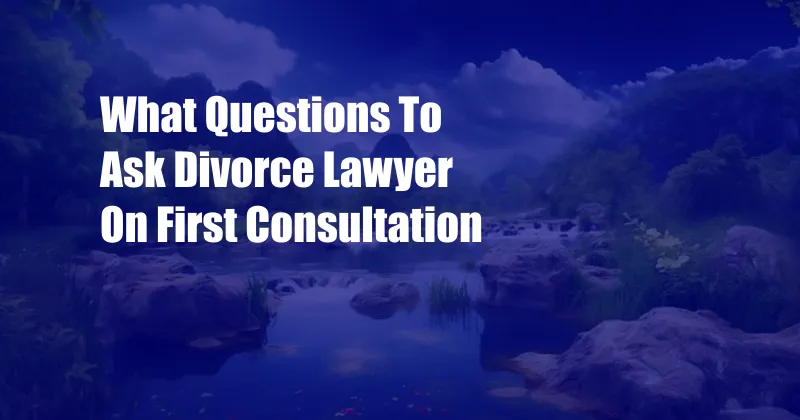
What Questions to Ask a Divorce Lawyer on Your First Consultation
Going through a divorce is an emotionally tumultuous and legally complex experience. To navigate this challenging time effectively, choosing the right divorce lawyer is paramount. Your first consultation with a potential attorney is a crucial step, laying the foundation for a successful partnership. Here are some insightful questions to ask during this initial meeting to ensure you find the right fit for your specific needs.
Understanding Your Rights and Options
Begin by inquiring about your legal rights and options. Ask the lawyer to explain the various divorce processes available in your jurisdiction, including fault-based, no-fault, and collaborative divorces. Seek clarity on the legal grounds for divorce and the potential consequences of different approaches.
Furthermore, explore the division of marital assets and debts, alimony, child support, and child custody arrangements. Understand how these matters are typically handled in your state and how your lawyer plans to advocate for your interests.
Fees and Billing
Transparency about fees is essential. Ask the lawyer to provide a clear explanation of their fee structure, including hourly rates, flat fees, or retainers. Inquire about any additional costs, such as filing fees, court costs, and expert witness fees.
Discuss payment plans and the frequency of billing. Ensure you understand the invoicing process and have no outstanding questions regarding financial arrangements.
Communication and Availability
Effective communication is vital throughout the divorce process. Ask the lawyer about their preferred methods of communication and how promptly they respond to inquiries. Inquire about their availability for consultations, meetings, and court appearances.
Consider how well the lawyer’s communication style aligns with your needs. Open and proactive communication can minimize stress and ensure a smooth working relationship.
Experience and Expertise
Inquire about the lawyer’s experience handling divorce cases. Ask about their track record of success, particularly in cases similar to yours. Explore their knowledge of family law, negotiation skills, and litigation experience.
Consider whether the lawyer is a member of any professional organizations or has received specialized training in family law. These credentials indicate a commitment to professional development and expertise in the field.
Personal Connection
While legal expertise is crucial, you should also feel a personal connection with your divorce lawyer. Ask questions that help you gauge their empathy, understanding, and ability to relate to your situation.
Look for an attorney who listens attentively, provides clear and compassionate guidance, and demonstrates a genuine interest in your well-being. A supportive relationship with your lawyer can make a profound difference during this challenging time.
Tips for a Successful Consultation
To maximize the effectiveness of your first consultation, prepare thoroughly. Gather relevant documents such as financial statements, tax returns, and any legal agreements related to your marriage.
Write down a list of questions to ensure you cover all important topics. Be specific and provide details about your situation. Be prepared to discuss your goals for the divorce process and any concerns you may have.
Additionally, dress professionally and arrive punctually for your appointment. Show respect for the lawyer’s time and expertise. Be open and honest about your situation, and be receptive to the lawyer’s advice and guidance.
Frequently Asked Questions
- How long will my divorce take?
The duration of a divorce varies depending on factors such as the complexity of the case, the willingness of both parties to cooperate, and the court’s schedule. - What are my chances of getting a favorable outcome?
While every case is unique, an experienced divorce lawyer can assess your situation and provide an informed opinion on your potential outcomes.
Call to Action
Choosing the right divorce lawyer is a crucial step towards navigating the challenges of divorce. By carefully considering the questions outlined above, you can increase your chances of finding an attorney who possesses the expertise, experience, and personal qualities to guide you through this complex process.
Are you interested in learning more about divorce law and the role of a divorce lawyer? Share your questions and experiences in the comments section below.